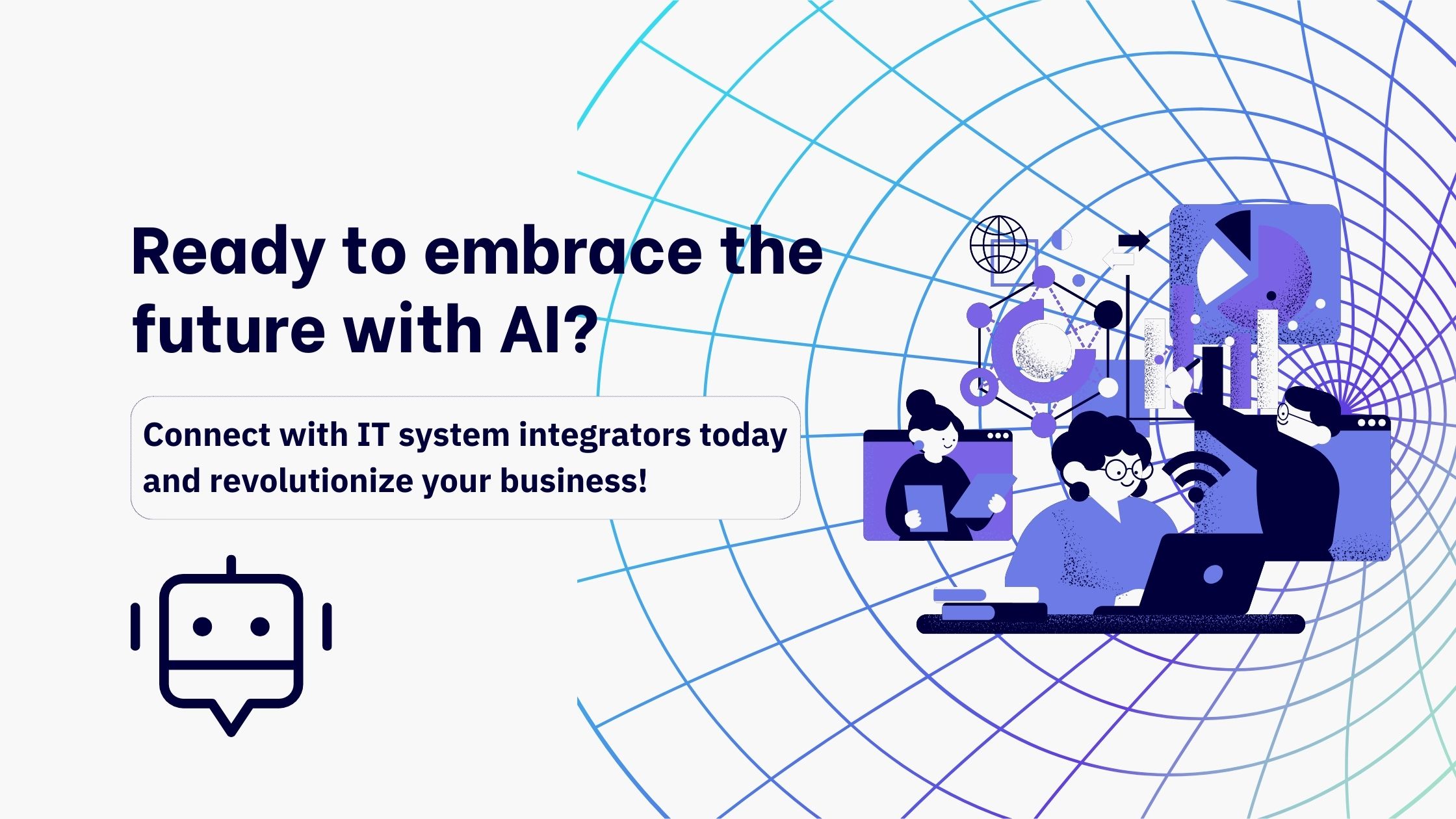Hey BuzzCoders, in our fast-paced tech world, artificial intelligence (AI) is like the superhero of innovation, ready to shake things up in every industry. Whether it’s pumping up efficiency or giving customers a wow experience, AI is the game-changer. But, diving into the AI wagon needs a smart plan, and that’s where IT system integrators step in – the real MVPs of this digital revolution!
Before delving into the role of IT system integrators in AI adoption, it is essential to what we all agree and understand: Why AI has become such a critical component of modern businesses. AI offers a wide range of benefits, including automation of repetitive tasks, improved business intelligence, enhanced customer service, optimized resource utilization, and better decision-making through data-driven insights. By leveraging AI technologies, businesses can stay ahead of the competition, drive growth, and unlock new opportunities.
The Evolution of AI Adoption
Over the past few years, AI adoption has experienced significant growth. According to recent studies, more than 50% of organizations have adopted AI in some capacity, with the number steadily increasing year after year. This surge in adoption can be attributed to the increasing awareness of AI’s potential and the availability of advanced AI tools, online platforms and conferences.
While AI adoption has seen substantial growth, organizations are still in varying stages of implementation. Larger companies have embraced AI as an integral part of their systems, while smaller and medium-sized enterprises (SMEs) are often in the pilot project phase, exploring AI’s potential in specific departments such as sales and marketing.
The Role of IT System Integrators in AI
IT system integrators play a crucial role in bridging the gap between businesses and AI technologies. These companies specialize in combining different IT systems, applications, and platforms to create a unified and efficient infrastructure for their clients.
When it comes to AI adoption, system integrators bring their expertise in integrating AI technologies seamlessly into existing systems, ensuring a smooth transition and maximizing the benefits of AI.
So let’s try to understand what these expertise and experience they bring in:
1. Understanding Business Needs
One of the primary responsibilities of IT system integrators is to understand the unique needs and goals of their clients. By conducting thorough assessments and evaluations, system integrators can identify areas within the organization where AI can have the most significant impact.
This includes analyzing existing processes, identifying pain points, and determining how AI technologies can streamline operations and drive efficiencies.
2. Designing AI Solutions
Once the business needs are identified, IT system integrators work closely with their clients to design tailored AI solutions that align with their specific requirements and objectives.
This involves selecting the appropriate AI tools, platforms, and frameworks that best suit the organization’s needs.
Whether it’s natural language processing, computer vision, or machine learning, system integrators have the expertise to identify and implement the right AI technologies.
3. Integration and Implementation
The successful integration of AI technologies into existing systems is a complex process that requires careful planning and execution.
IT system integrators take on the responsibility of seamlessly integrating AI tools and platforms into the organization’s infrastructure, ensuring compatibility and interoperability with existing systems.
This involves customizing and configuring AI solutions to meet the unique requirements of the organization.
4. Data Management and Integration
Data is like AI’s oxygen, and making sure we handle it well is key to making AI work smoothly.
IT system integrators assist organizations in collecting, cleaning, and integrating data from various sources, creating a centralized and reliable data repository.
This ensures that AI algorithms have access to high-quality data for training and analysis, leading to more accurate and valuable insights.
5. Training and Upskilling
AI adoption requires not only the implementation of technology but also the development of internal capabilities.
IT system integrators play a vital role in training and upskilling employees to leverage AI technologies effectively. This includes providing training programs, workshops, and resources to help employees understand AI concepts, use AI tools, and analyze AI-generated insights.
By empowering employees with AI skills, organizations can foster a culture of innovation and drive AI adoption from within.
6. Ongoing Support and Maintenance
AI adoption is an ongoing process, and IT system integrators provide continuous support and maintenance to ensure the smooth operation of AI systems.
This includes monitoring performance, troubleshooting issues, and making necessary updates and enhancements to keep AI technologies up-to-date and aligned with evolving business needs.
System integrators also stay informed about the latest advancements in AI and proactively recommend upgrades or new solutions to their clients.
Examples of Successful AI Adoption
Numerous organizations have successfully adopted AI with the help of IT system integrators, enabling them to gain a competitive edge and achieve significant business outcomes.
Let’s explore a few examples of how AI adoption has driven success in various industries:
1. Manufacturing and Supply Chain Optimization
AI has revolutionized the manufacturing industry by enabling real-time monitoring of production processes, predictive maintenance, and demand forecasting. By leveraging AI technologies, manufacturers can optimize their supply chain, reduce downtime, and enhance productivity.
For example, AI-powered predictive analytics can analyze historical data to identify potential equipment failures and proactively schedule maintenance, minimizing unplanned downtime and maximizing operational efficiency.
2. Healthcare and Personalized Medicine
AI has the potential to transform healthcare by enabling personalized medicine, early disease diagnosis, and precision treatment plans. By analyzing vast amounts of patient data, AI algorithms can identify patterns, detect anomalies, and provide valuable insights to healthcare professionals.
For instance, AI-powered imaging analysis can assist radiologists in detecting early signs of diseases such as cancer, improving diagnostic accuracy and patient outcomes.
3. Retail and Customer Experience
AI technologies have revolutionized the retail industry by enabling personalized customer experiences, targeted marketing campaigns, and demand forecasting. AI-powered recommendation engines analyze customer preferences and behaviors to provide personalized product recommendations, enhancing customer satisfaction and driving sales.
Additionally, AI algorithms can analyze customer data to identify emerging trends and predict future demand, enabling retailers to optimize inventory management and improve supply chain efficiency.
4. Finance and Fraud Detection
AI has become a powerful tool in the finance industry for fraud detection and prevention. AI algorithms can analyze vast amounts of financial data, identify suspicious patterns, and flag potential fraudulent activities in real time. This helps financial institutions mitigate risks, protect customer assets, and ensure regulatory compliance.
By leveraging AI technologies, organizations can significantly reduce the financial losses associated with fraud.
The Ideal Path to AI Adoption
While each organization’s AI adoption journey may vary, some key steps can help guide the process. Here is an ideal path to AI adoption that organizations can follow:
1. Define Clear Objectives
Before embarking on the AI adoption journey, organizations need to define clear objectives and identify the specific business problems they aim to solve with AI. This involves conducting a thorough assessment of existing processes, identifying pain points, and determining the expected outcomes from AI adoption.
2. Develop an AI Strategy
Once the objectives are defined, organizations need to develop a comprehensive AI strategy that aligns with their business goals. This includes selecting the right AI technologies, platforms, and tools that will enable them to achieve their objectives. It’s crucial to involve key stakeholders and experts in the development of the AI strategy to ensure alignment with business needs.
3. Partner with an IT System Integrator
Partnering with an experienced IT system integrator is crucial for successful AI adoption. System integrators bring their expertise in AI technologies, data management, and system integration, ensuring a seamless and efficient implementation process. They can provide valuable insights, guidance, and support throughout the AI adoption journey.
4. Build a Robust Data Infrastructure
Effective data management is essential for successful AI adoption. Organizations need to build a robust data infrastructure that can collect, store, and process large volumes of data. This includes data cleaning, integration, and ensuring data quality and security. By establishing a solid data foundation, organizations can unlock the full potential of AI technologies.
5. Invest in Talent Development
AI adoption requires skilled professionals who can leverage AI technologies effectively. Organizations should invest in talent development programs to upskill existing employees and attract AI talent. This includes providing training, resources, and opportunities for employees to learn and apply AI concepts. By nurturing a culture of continuous learning and innovation, organizations can create a workforce that is well-equipped to drive AI adoption.
6. Start Small and Scale
AI adoption is a journey that should start with small, manageable projects. Organizations should identify low-risk use cases where AI can have a significant impact and begin with pilot projects. This allows organizations to test and validate AI technologies, learn from the experience, and gradually scale up AI adoption across the organization.
7. Continuously Evaluate and Improve
AI adoption is an iterative process, and organizations should continuously evaluate the impact of AI technologies and make improvements based on feedback and insights. This includes monitoring key performance indicators, measuring the return on investment, and adapting the AI strategy to evolving business needs and technological advancements.
Conclusion
In a nutshell, hopping on the AI train is a big deal for businesses that want to keep up and be super innovative. Those IT system integrators? They’re like the sidekicks making sure everything runs smoothly with AI.
Stick to a smart plan, get the right pals, and voilà! Businesses can use AI to grow, make customers happy, and rock the digital world in the long run.
So keep learning new tech & keep integrating them!






